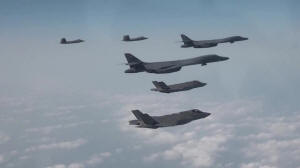North Korea says U.S. drills threaten to turn region into 'critical war
zone'
 Send a link to a friend
Send a link to a friend
 [February 02, 2023]
By Josh Smith [February 02, 2023]
By Josh Smith
SEOUL (Reuters) -North Korea said on Thursday that drills by the United
States and its allies have reached an "extreme red-line" and threaten to
turn the peninsula into a "huge war arsenal and a more critical war
zone."
The Foreign Ministry statement, carried by state news agency KCNA, said
Pyongyang was not interested in dialogue as long as Washington pursues
hostile policies.
"The military and political situation on the Korean peninsula and in the
region has reached an extreme red-line due to the reckless military
confrontational manoeuvres and hostile acts of the U.S. and its vassal
forces," an unnamed ministry spokesperson said in the statement.
It cited a visit to Seoul this week by U.S. Defense Secretary Lloyd
Austin. On Tuesday, Austin and his South Korean counterpart vowed to
expand military drills and deploy more "strategic assets," such as
aircraft carriers and long-range bombers, to counter North Korea's
weapons development and prevent a war.

"This is a vivid expression of the U.S. dangerous scenario which will
result in turning the Korean peninsula into a huge war arsenal and a
more critical war zone," the North Korean statement said.
The United States has pushed to expand military, political, and economic
ties across Asia.
In Manila on Thursday, Austin and his counterpart there announced that
the Philippines had granted the United States expanded access to its
military bases amid mounting concern over China's increasing
assertiveness in the disputed South China Sea and tensions over
self-ruled Taiwan.
When asked about the tensions with North Korea during his stop in the
Philippines, Austin said that the U.S. goal was to promote greater
security and stability and that it remained committed to defending South
Korea.
"We will continue to work alongside our allies and train and ensure that
we maintain credible and ready forces," he said.
North Korea said it would respond to any military moves by the United
States, and had strong counteraction strategies, including "the most
overwhelming nuclear force" if necessary.
JOINT DRILLS
On Wednesday, the United States and South Korea carried out a joint air
drill with American B-1B heavy bombers and F-22 stealth fighters, as
well as F-35 jets from both countries, according to South Korea's
Defense Ministry.
"The combined air drills this time show the U.S.' will and capabilities
to provide strong and credible extended deterrence against North Korea's
nuclear and missile threats," the Defense Ministry said in a statement.
[to top of second column]
|

North Korea's Foreign Ministry said on
Thursday that drills by the United States and its allies have pushed
the situation to an "extreme red-line" and threaten to turn the
peninsula into a "huge war arsenal and a more critical war zone."
Flora Bradley-Watson reports.

In Washington, the White House rejected the North Korean statement
and reiterated a willingness to meet with North Korean diplomats "at
a time and place convenient for them."
"We have made clear we have no hostile intent toward the DPRK and
seek serious and sustained diplomacy to address the full range of
issues of concern to both countries and the region," said a
spokesperson for the White House National Security Council, refering
to the Democratic People's Republic of Korea, the official name for
North Korea.
More than 28,500 American troops are based in South Korea as a
legacy of the 1950-1953 Korean War, which ended in an armistice
rather than a peace treaty.
"We reject the notion that our joint exercises with partners in the
region serve as any sort of provocation. These are routine exercises
fully consistent with past practice," the White House statement
said.
Last year, North Korea conducted a record number of ballistic
missile tests, which are banned by U.N. Security Council
resolutions. It was also observed reopening its shuttered nuclear
weapons test site, raising expectations of a nuclear test for the
first time since 2017.
In New York, South Korea's foreign minister, Park Jin, met with the
United Nations Secretary-General Antonio Guterres on Wednesday and
called for the U.N.'s continued attention to North Korea's recent
provocations and efforts to implement sanctions on the reclusive
regime.
Guterres said any resumption of nuclear testing by North Korea would
deal a devastating blow to regional and international security, and
reaffirmed support to build lasting peace on the Korean peninsula,
according to Park's office.

Park is on a four-day trip to the United States, which will include
a meeting with U.S. Secretary of State Antony Blinken in Washington
on Friday.
(Reporting by Josh Smith; Additional reporting by Soo-hyang Choi in
Seoul, Steve Holland in Washington, and Karen Lema in Manila;
Editing by Jonathan Oatis, Bill Berkrot, Gerry Doyle and Nick Macfie)
[© 2023 Thomson Reuters. All rights
reserved.]This material may not be published,
broadcast, rewritten or redistributed.
Thompson Reuters is solely responsible for this content. |